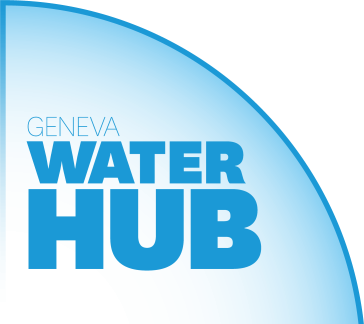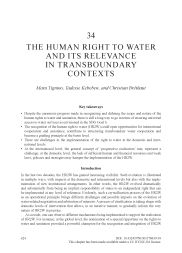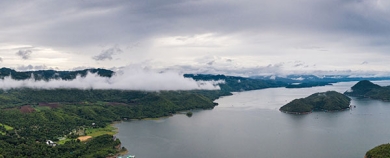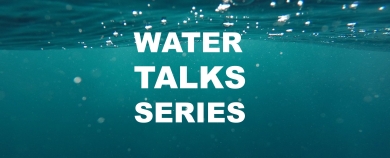
Chapitre - Le droit humain à l'eau et sa pertinence dans les contextes transfrontaliers - Routledge Handbook of Water Diplomacy
Définir l'agenda de la recherche
Publication scientifique
Au cours des deux dernières décennies, des progrès significatifs ont été réalisés dans la cristallisation d'un droit de l'homme à l'eau (DIE) autonome, fondé sur les règles internationales existantes et les pratiques des décideurs politiques et des parties prenantes. La reconnaissance du droit à l'eau est essentielle pour garantir d'autres droits de l'homme, tels que le droit à la vie, à la santé et au bien-être.
Par Mara Tignino, Tadesse Kebebew et Christian Bréthaut

Après une brève présentation du discours sur les droits de l'homme relatifs à l'eau, ce chapitre explore l'émergence du droit à l'eau et sa base juridique et examine la portée et la nature de ce droit. Il examine également les implications de la reconnaissance du droit à l'eau, y compris le contexte des cours d'eau transfrontaliers et les difficultés potentielles liées à la réalisation de ce droit. Il souligne en outre la nécessité d'une application prudente du droit à l'eau pour tenir compte des préoccupations des différents acteurs dans les négociations sur l'utilisation et la gestion des ressources en eau.
Principaux enseignements
- Malgré les énormes progrès réalisés dans la reconnaissance et la définition de la portée et de la nature des droits de l'homme à l'eau et à l'assainissement (
), il reste un long chemin à parcourir pour garantir l'accès universel aux services d'eau (
), comme le prévoit l'objectif 6 des ODD. - La reconnaissance du droit de l'homme à l'eau (HR2W) pourrait ouvrir des possibilités de coopération et d'assistance internationales sur le site
, contribuer à structurer la coopération transfrontalière dans le domaine de l'eau et
devenir un principe directeur au niveau du bassin. - La mise en œuvre du droit à l'eau se heurte à des difficultés au niveau national et international (
). - Au niveau international, le concept général de "réalisation progressive" peut représenter un défi
; au niveau national, le manque de ressources humaines et financières suffisantes et la faiblesse des lois, politiques et stratégies
peuvent entraver la mise en œuvre du droit à l'égalité entre les hommes et les femmes.




